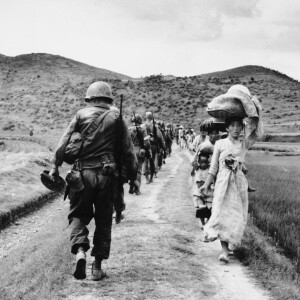
As the UN forces gain momentum following the Battle of Incheon, they must decide whether to continue advancing north of the 38th parallel. Meanwhile, China and the Soviet Union weigh the possibility of intervening on behalf of their North Korean comrades.
Email me: perspectivesinhistorypod@gmail.com
Bibliography
Cumings, Bruce. The Korean War: A History. Modern Library, 2011.
Halliday, John and Cumings, Bruce. Korea: The Unknown War. Pantheon Books, 1988.
Haruki, Wada. The Korean War: An International History. Rowman & Littlefield, 2018.
Hanley, Charles J. Ghost Flames: Life and Death in a Hidden War, Korea 1950-1953. Hachette Book Group Inc, 2020.
Hastings, Max. The Korean War. Simon and Schuster, 1987.
Jager, Sheila Miyoshi. Brothers at War: The Unending Conflict in Korea. W.W. Norton & Company, 2013.
Mitchell, Arthur H. Understanding the Korean War: The Participants, the Tactics, and the Course of the Conflict. McFarland & Company, 2013.
Peters, Richard and Li, Xiaobing. Voices from the Korean War: American, Korean, and Chinese Soldiers. The University Press of Kentucky, 2004.
Shinn, Bill. The Forgotten War Remembered, Korea: 1950-1953. Hollym International Corp, 1996.
Cover Image: As U.S. infantrymen march into the Naktong River region, they pass a line of fleeing refugees. August 11th, 1950. (Photo by Bettmann via Getty Images)
Opening Theme: Symphony No. 9 in E minor, "From the New World", Op. 95, B. 178 by Antonín Dvořák
Closing Theme: Arirang, traditional Korean song, performed by the New York Philharmonic in Pyongyang, 2008.
No comments yet. Be the first to say something!